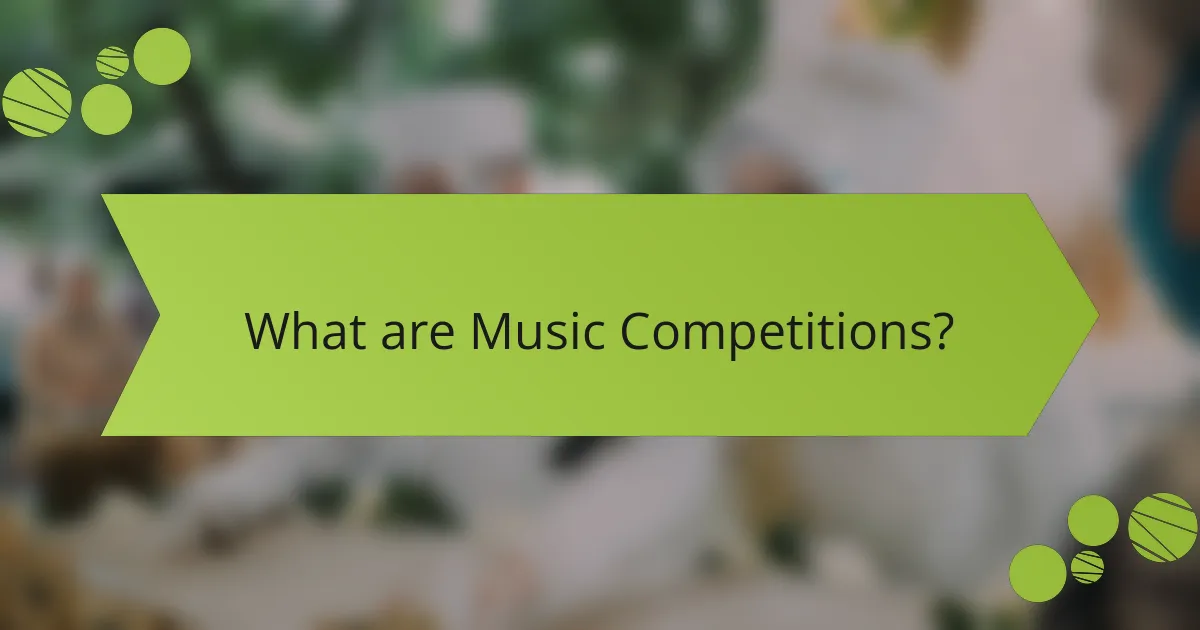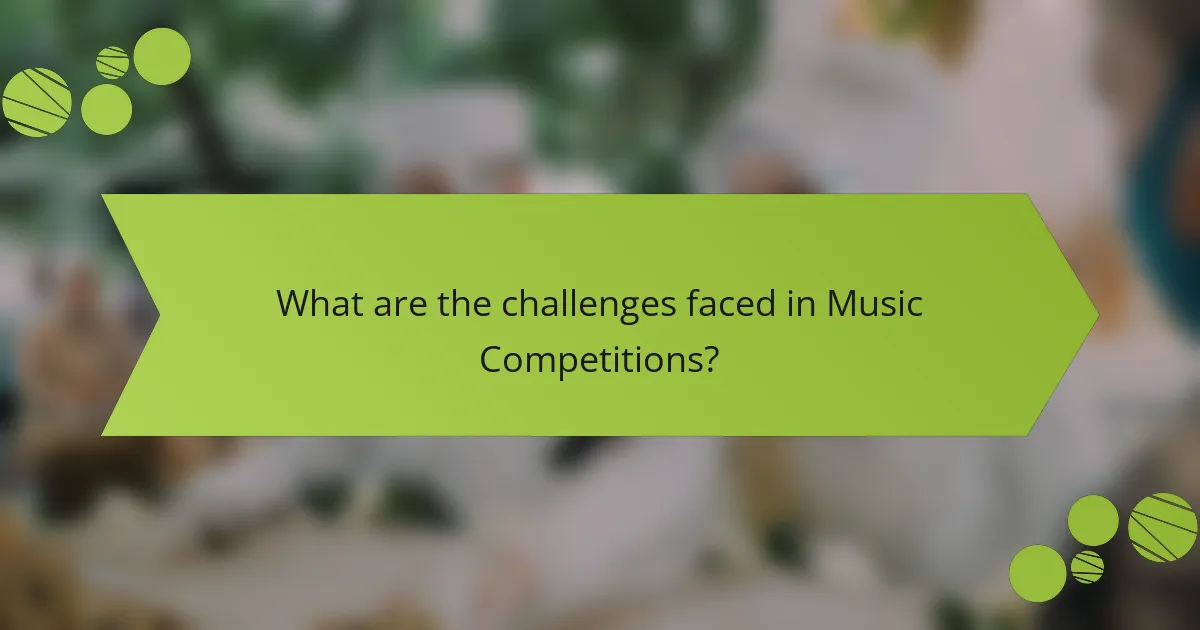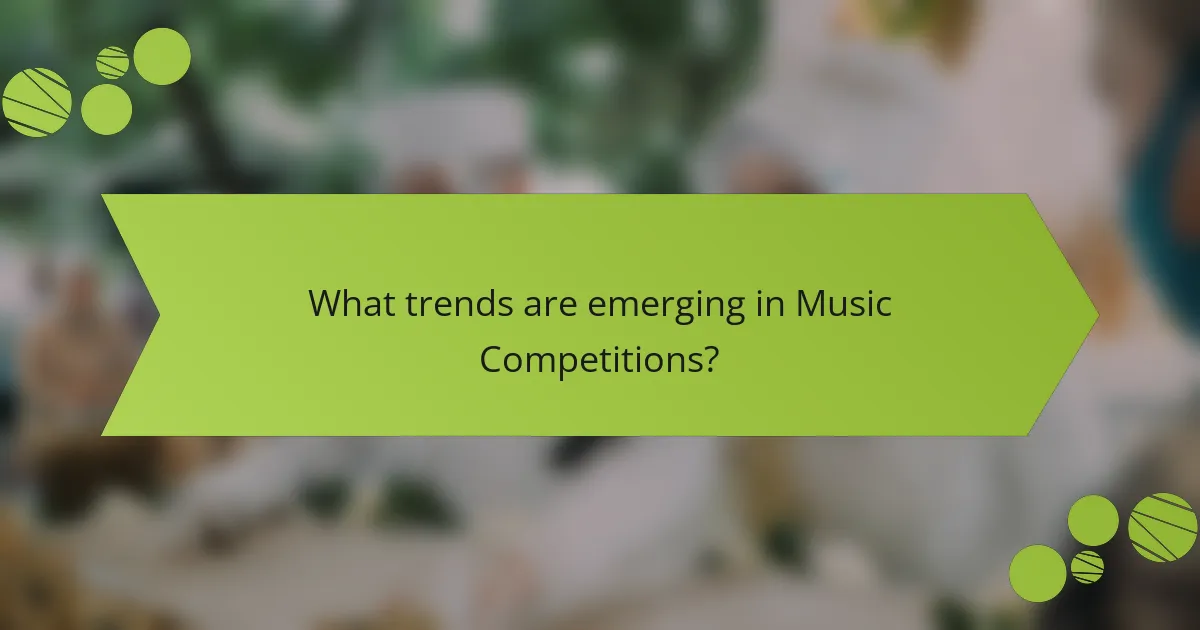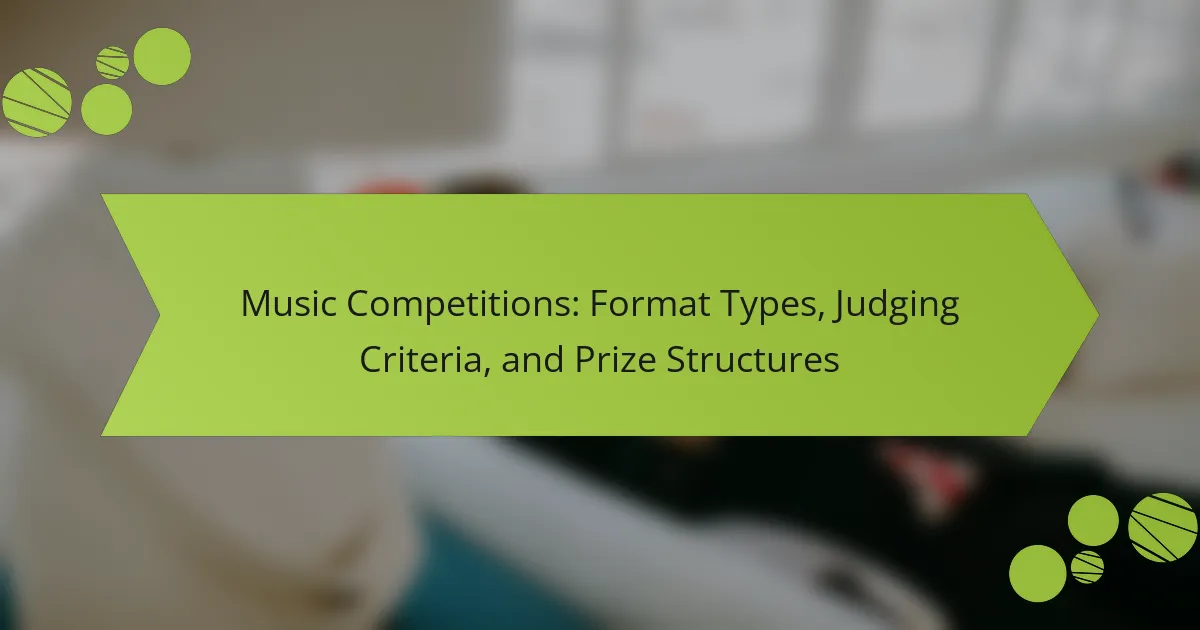Music competitions are structured events where musicians perform to demonstrate their abilities and artistry, judged by experts based on criteria such as technical skill and creativity. These competitions can take various forms, including solo acts, ensembles, and orchestral showcases, and are held at local, national, or international levels. Participants face challenges such as intense competition, subjective judging, and performance-related stress, while also navigating financial constraints. Recent trends indicate a shift towards technology integration, increased accessibility, and a focus on mental health support, reflecting the evolving landscape of music competitions. The article will explore the different formats, judging criteria, and prize structures associated with music competitions.

What are Music Competitions?
Music competitions are organized events where musicians perform to showcase their skills and talents. These competitions can vary in format, including solo performances, ensemble presentations, or orchestral showcases. Participants are often judged by a panel of experts based on criteria such as technical proficiency, creativity, and stage presence. Music competitions can be local, national, or international in scope. They provide opportunities for exposure, networking, and career advancement for aspiring musicians. Many prestigious music competitions have a long history, such as the International Chopin Piano Competition, established in 1927, which has launched the careers of numerous renowned pianists.
How do Music Competitions differ from other performance events?
Music competitions differ from other performance events primarily through their structured evaluation and ranking system. In music competitions, participants are judged based on specific criteria such as technique, expression, and originality. This contrasts with general performance events that may focus more on entertainment value or audience engagement. Competitions often feature a panel of judges with expertise in music, providing objective assessments. Additionally, competitions typically offer prizes such as scholarships, trophies, or performance opportunities, which incentivize participants. This competitive element creates a distinct atmosphere compared to non-competitive performances. Overall, the emphasis on evaluation, ranking, and rewards sets music competitions apart from other types of performance events.
What are the various formats of Music Competitions?
Music competitions can take various formats. Common formats include solo performances, group ensembles, and orchestral competitions. Solo performances focus on individual musicians showcasing their skills. Group ensembles involve multiple musicians performing together, highlighting teamwork and harmony. Orchestral competitions feature larger groups, typically focusing on classical music. Other formats include online competitions, which allow participants to submit recorded performances. Additionally, there are genre-specific competitions, such as jazz, classical, or pop music contests. Each format serves different purposes and appeals to various audiences.
What role do genres play in Music Competitions?
Genres in music competitions serve as a framework for categorizing performances. They help judges evaluate participants based on specific stylistic criteria. Different genres have unique characteristics that influence judging standards. For example, classical music emphasizes technical skill, while pop may prioritize stage presence. This distinction allows for fair comparisons among contestants. Additionally, genres can attract diverse audiences and participants. Music competitions often feature various genres to broaden appeal and participation. This diversity enriches the competition experience for both performers and spectators. Ultimately, genres shape the structure and dynamics of music competitions.
What are the common formats of Music Competitions?
Common formats of music competitions include solo performances, group ensembles, and orchestral competitions. Solo performances feature individual musicians showcasing their skills. Group ensembles involve bands or choirs competing together. Orchestral competitions typically include larger ensembles performing symphonic works. Other formats may include online submissions, where participants submit recordings for evaluation. Additionally, some competitions focus on specific genres, such as classical, jazz, or contemporary music. These formats are designed to evaluate various musical skills and styles, ensuring a comprehensive assessment of talent.
How does a solo competition format work?
A solo competition format features individual participants competing independently. Each competitor performs their piece before a panel of judges. Judges evaluate performances based on defined criteria such as technique, expression, and originality. Scores are typically assigned to each criterion. The competitor with the highest cumulative score wins the competition. Solo formats promote personal artistry and showcase individual talent. This structure is prevalent in music competitions, allowing for focused assessment of each participant’s skills.
What are the features of ensemble competitions?
Ensemble competitions feature multiple musicians performing together as a cohesive group. These competitions assess musicality, teamwork, and technical skill. Judging criteria typically include harmony, dynamics, and interpretation of the piece. Ensembles often perform a selected repertoire, which may vary in style and complexity. Scoring is usually based on both individual performance and overall group cohesion. Prizes may include scholarships, trophies, or performance opportunities. These competitions foster collaboration and enhance ensemble playing skills among participants.
What is the significance of online competitions?
Online competitions are significant as they provide accessible platforms for participants worldwide. They eliminate geographical barriers, enabling diverse participation. This inclusivity fosters a rich exchange of ideas and talents. Online competitions often feature innovative formats that enhance engagement. They also allow for real-time feedback from judges and peers. The digital nature of these events can lead to increased visibility for participants. Additionally, they often have lower entry costs compared to traditional competitions. This affordability encourages more musicians to showcase their skills.
What are the typical judging criteria in Music Competitions?
Typical judging criteria in music competitions include technical skill, musicality, stage presence, and interpretation. Technical skill assesses the performer’s proficiency with their instrument or voice. Musicality evaluates the expressiveness and emotional delivery of the performance. Stage presence refers to the performer’s ability to engage and connect with the audience. Interpretation is about how well the performer conveys the composer’s intent and personal artistry. These criteria are commonly used across various music competitions to ensure a comprehensive evaluation of participants.
How are technical skills evaluated by judges?
Judges evaluate technical skills through a structured assessment of performance criteria. They observe aspects such as precision, accuracy, and technique. Specific criteria include note accuracy, rhythm consistency, and dynamic control. Judges may use a scoring rubric to quantify these elements. Each performance is typically rated on a scale, often from 1 to 10. Feedback may also be provided to highlight strengths and areas for improvement. This evaluation process ensures a fair and consistent judgment across competitors.
What importance do performance skills hold in judging?
Performance skills are crucial in judging music competitions. They directly impact the overall impression of a performer. Judges evaluate technical proficiency, expressiveness, and stage presence. High performance skills often lead to higher scores. They demonstrate a musician’s dedication and practice. Competitions frequently prioritize these skills in their criteria. For instance, the International Society for Music Education emphasizes performance quality in assessments. Thus, strong performance skills significantly influence judging outcomes.
How do judges assess creativity and originality?
Judges assess creativity and originality by evaluating the uniqueness and inventiveness of a work. They consider how well the work stands out from existing pieces. Judges look for fresh ideas and innovative approaches in composition and performance. Originality is measured against established norms and expectations within the genre. Creativity is often judged based on emotional impact and engagement with the audience. Specific criteria may include the use of unconventional techniques or unexpected elements. Judges may also reference historical context to determine the novelty of the work. This assessment process ensures a comprehensive evaluation of artistic merit in music competitions.
What prize structures are commonly found in Music Competitions?
Common prize structures in music competitions include cash prizes, scholarships, and performance opportunities. Cash prizes are often awarded to top finalists and can range from small amounts to substantial sums. Scholarships may cover tuition for music schools or conservatories. Performance opportunities often include gigs, recitals, or recording contracts. Additionally, some competitions offer mentorship or masterclasses with industry professionals. These structures incentivize participation and recognize talent. Many prestigious competitions, such as the International Chopin Piano Competition, utilize these prize structures to attract skilled musicians.
What types of prizes can participants expect?
Participants in music competitions can expect a variety of prizes. Common prizes include cash awards, scholarships, and music equipment. Other prizes may consist of performance opportunities, recording contracts, and mentorship sessions. Some competitions offer trophies or certificates as recognition. Additionally, winners might receive exposure through media coverage or social media promotion. The specific types of prizes vary based on the competition’s format and sponsors. For instance, prestigious competitions often provide larger cash prizes and opportunities for international performances.
How do monetary prizes compare to scholarships or opportunities?
Monetary prizes provide immediate financial rewards, while scholarships often cover educational expenses over time. Scholarships can also include additional benefits, such as mentorship and networking opportunities. Monetary prizes are typically awarded once, whereas scholarships are renewable based on academic performance. In music competitions, monetary prizes may incentivize participation but do not guarantee long-term benefits. Scholarships, in contrast, can support ongoing education and skill development. According to a study by the National Endowment for the Arts, scholarships significantly increase access to education in the arts. This demonstrates that while both monetary prizes and scholarships have value, scholarships often offer more comprehensive support for long-term growth.
How do participants prepare for Music Competitions?
Participants prepare for music competitions by practicing extensively. They focus on mastering their chosen pieces. Regular rehearsals help improve their technical skills. Participants often seek feedback from teachers or peers. They may also record their performances for self-evaluation. Mental preparation is crucial, including visualization techniques. Participants familiarize themselves with the competition format. This includes understanding judging criteria and performance expectations.
What strategies can help improve performance skills?
Regular practice enhances performance skills. Consistent rehearsal solidifies techniques and builds muscle memory. Setting specific goals provides direction and motivation. Feedback from instructors or peers offers valuable insights for improvement. Recording performances allows for self-assessment and identification of areas needing work. Mental practice, such as visualization, can improve focus and confidence. Engaging in mock competitions simulates real performance conditions. Finally, maintaining physical and mental well-being supports overall performance capability.
How can competitors effectively choose their repertoire?
Competitors can effectively choose their repertoire by considering several key factors. First, they should assess their strengths and weaknesses. This allows them to select pieces that showcase their skills. Next, competitors must consider the competition’s judging criteria. Understanding what judges value can guide repertoire selection.
Additionally, competitors should choose pieces that resonate with their personal style. This can enhance their performance authenticity. They should also consider the audience’s preferences. Engaging the audience can lead to a more memorable performance.
Finally, competitors should practice their chosen pieces thoroughly. Mastery of the repertoire will boost their confidence during the competition. Selecting a well-rounded repertoire that includes varied styles can also demonstrate versatility. This approach can increase their chances of success in music competitions.

What are the challenges faced in Music Competitions?
Music competitions face several challenges that impact participants and organizers. One major challenge is intense competition among skilled musicians. Participants often struggle to stand out in a crowded field. Additionally, subjective judging can lead to inconsistent results. Judges may have personal biases that affect their evaluations. Time constraints also pose difficulties, as performers must deliver their best within limited performance windows. Furthermore, financial pressures can hinder access to resources, such as professional coaching or high-quality instruments. Lastly, the stress of public performance can affect a musician’s ability to perform at their best. These challenges create a complex environment for music competitions.
How do competitors handle performance anxiety?
Competitors handle performance anxiety through various techniques. These techniques include visualization, deep breathing, and positive self-talk. Visualization involves imagining a successful performance to build confidence. Deep breathing helps to calm the nervous system and reduce tension. Positive self-talk encourages a constructive mindset and counters negative thoughts. Research indicates that these strategies can significantly lower anxiety levels. A study published in the Journal of Sport Psychology found that athletes using these techniques reported lower anxiety and better performance outcomes. Competitors also seek support from peers and mentors to share experiences and coping strategies.
What techniques can help manage stress before and during competitions?
Breathing exercises can help manage stress before and during competitions. These techniques promote relaxation and focus. Deep breathing reduces anxiety by lowering heart rate and calming the mind. Visualization techniques also aid in stress management. Athletes often use imagery to envision successful performances. This method enhances confidence and reduces performance anxiety. Mindfulness meditation can further alleviate stress. Practicing mindfulness increases awareness and helps maintain focus during competitions. Regular physical exercise is another effective stress management technique. Exercise releases endorphins, which improve mood and reduce stress levels. Together, these techniques can significantly improve performance under pressure.
What are the benefits of participating in Music Competitions?
Participating in music competitions offers several benefits. These include skill enhancement, exposure to industry professionals, and networking opportunities. Competitors can refine their performance abilities through structured feedback from judges. This feedback often highlights areas for improvement, fostering growth as a musician. Additionally, competitions provide a platform to showcase talent to a broader audience. This exposure can lead to potential career opportunities in music. Many competitions also offer scholarships or prizes, incentivizing participation. Overall, these benefits contribute to a musician’s development and career advancement.
How can competition experiences enhance musical skills?
Competition experiences enhance musical skills by providing structured performance opportunities. These experiences foster discipline and practice consistency. Musicians often prepare extensively for competitions, improving their technical abilities. Feedback from judges offers valuable insights for skill development. Additionally, competing can boost confidence and stage presence. Research shows that musicians who participate in competitions often achieve higher levels of proficiency. A study by the National Association for Music Education found that competition participants demonstrated improved performance metrics compared to non-participants. Overall, competition experiences are instrumental in advancing musical skills.
What networking opportunities arise from Music Competitions?
Music competitions provide various networking opportunities for participants. They connect musicians with industry professionals such as producers, agents, and venue owners. Competitions often attract talent scouts looking for new artists. Participants can meet fellow musicians, leading to potential collaborations. Networking events or workshops are frequently organized alongside competitions. These events facilitate relationship-building within the music community. Additionally, winners and finalists gain visibility that can lead to further opportunities. Overall, music competitions serve as a platform for establishing valuable industry connections.

What trends are emerging in Music Competitions?
Emerging trends in music competitions include increased use of technology and social media engagement. Many competitions now utilize online platforms for submissions and voting. This shift allows for greater accessibility and participation from global audiences. Additionally, competitions are incorporating diverse genres and styles, reflecting the evolving music landscape. There is also a focus on mental health support for participants, recognizing the pressures of competition. Furthermore, collaborations with industry professionals are becoming more common, providing contestants with valuable networking opportunities. These trends indicate a shift towards inclusivity and innovation in the music competition space.
How is technology influencing Music Competitions?
Technology is significantly influencing music competitions by enhancing accessibility and participation. Online platforms allow contestants from diverse locations to enter competitions without geographical limitations. Digital tools facilitate real-time feedback and interaction between judges and participants. Social media enables wider audience engagement and voting mechanisms. Streaming services provide a platform for showcasing performances beyond traditional venues. Data analytics help assess performance metrics and judge decisions more transparently. Virtual reality and augmented reality are emerging as innovative ways to enhance audience experiences. The integration of technology is transforming how competitions are organized, judged, and experienced.
What role does social media play in promoting competitions?
Social media serves as a vital platform for promoting competitions. It enables organizers to reach a broad audience quickly and efficiently. Social media platforms facilitate engagement through shares, likes, and comments. This interaction encourages participants to spread the word about competitions. Additionally, targeted advertising on social media can attract specific demographics. According to a survey by Statista, 54% of social media users reported discovering events through these platforms. The visual nature of platforms like Instagram and TikTok enhances promotional efforts through appealing content. Social media also allows real-time updates and interaction during competitions, fostering a sense of community.
What are best practices for succeeding in Music Competitions?
To succeed in music competitions, participants should focus on preparation, performance, and presentation. Thoroughly understand the competition’s rules and judging criteria. This knowledge allows musicians to tailor their performances to what judges value most. Regular practice is essential for mastering the piece and building confidence. Engaging a teacher or mentor can provide valuable feedback and guidance.
Rehearsing in front of an audience simulates the competition environment, reducing performance anxiety. Additionally, attention to stage presence and attire can enhance the overall impression. Being punctual and organized helps avoid unnecessary stress on competition day. Finally, maintaining a positive mindset and resilience in the face of challenges can significantly impact performance quality.
How can competitors effectively showcase their talents?
Competitors can effectively showcase their talents by performing with confidence and precision. They should select pieces that highlight their strengths and unique abilities. Engaging with the audience enhances the performance experience. Competitors must practice consistently to ensure technical proficiency. Visual presentation, including attire and stage presence, also plays a crucial role. Utilizing effective communication skills during introductions can create a personal connection. Feedback from judges can help refine their performances. Research shows that performers who engage audiences tend to receive higher scores in competitions.
What common mistakes should be avoided in competitions?
Common mistakes to avoid in competitions include lack of preparation, poor time management, and ignoring guidelines. Competitors often underestimate the importance of practice. Insufficient rehearsal can lead to performance errors. Time management is crucial; failing to allocate time wisely can result in rushed performances. Ignoring competition rules can lead to disqualification. Overconfidence can also lead to complacency, affecting performance quality. Lastly, neglecting to seek feedback can prevent improvement. These mistakes can significantly impact competitive outcomes.
Music competitions are organized events where musicians perform to demonstrate their skills, with formats including solo performances, group ensembles, and orchestral showcases. Participants are evaluated by judges based on criteria such as technical proficiency, creativity, and stage presence, with various prize structures that may include cash awards, scholarships, and performance opportunities. The article explores the different formats of music competitions, the significance of genres, typical judging criteria, and strategies for preparation, while also addressing the challenges faced by competitors and emerging trends influenced by technology and social media. Overall, the content provides a comprehensive overview of the music competition landscape, highlighting the benefits and best practices for participants.
